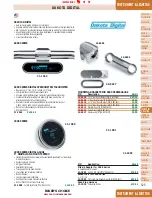
Important Safety Information
Important Safety Precautions
Your motorcycle can provide many years of
pleasure, if you take responsibility for your own
safety and understand the challenges you can
meet in competitive racing.
There is much that you can do to protect yourself
when you ride. You’ll find many helpful
recommendations throughout this manual. The
following are a few that we consider most
important.
Always Wear a Helmet
. It’s a proven fact:
helmets significantly reduce the number and
severity of head injuries. So always wear an
approved motorcycle helmet. We also
recommended that you wear eye protection,
sturdy boots, gloves, and other protective gear.
Never Carry a Passenger.
Your motorcycle is
designed for one person only. There are no
handholds, footrests, or seat for a second
person–so never carry a passenger. A passenger
could interfere with your ability to move around
to maintain your balance and control of the
motorcycle.
Ride Off-Road Only.
Your motorcycle is
designed and manufactured for off-road use only.
The tires are not made for pavement, and the
motorcycle does not have turn signals and other
features required for use on public roads. If you
need to cross a paved or public road, get off and
walk your motorcycle across.
Always Wear Protective Gear.
We recommend
that you wear sturdy, boots, gloves, and other
protective gear. The exhaust system becomes
very hot during operation, and it remains hot
after operation. Never touch any part of the hot
Keep Your Honda In Safe Condition.
It’s
important to keep your motorcycle properly
maintained and in safe riding condition. Having a
breakdown can be difficult, especially if you are
stranded off-road far from your base. To help
avoid problems, inspect your motorcycle before
every ride and perform all recommended
maintenance.
2
Motorcycle Safety
exhaust system. Wear clothing that fully covers
your legs.
Do not wear loose clothing which could catch on
the control levers, kickstarter, footpegs, drive
chain, or wheels.
Take Time to Learn and Practice.
Developing
off-road riding skills is a gradual, step-by-step
process. Start by practicing at low speed in a safe
area and slowly build your skills.
Personal instruction from an experienced rider
can also be valuable.
If you need assistance, ask your dealer about
riding groups in your area.
Also be sure to read the
Tips & Practice Guide
for the Off-Highway Motorcyclist
booklet that
came with your motorcycle (USA only).
Be Alert for Off-Road Hazards.
The terrain can
present a variety of challenges when you ride
off-road. Continually ‘‘read” the terrain for
unexpected turns, drop-offs, rocks, ruts, and other
hazards. Always keep your speed low enough to
allow time to see and react to hazards.
Ride within Your Limits.
Pushing limits is
another major cause of motorcycle accidents.
Never ride beyond your personal abilities or
faster than conditions warrant. Remember that
alcohol, drugs, fatigue, and inattention can
significantly reduce your ability to make good
judgments and ride safety.
Don’t Drink and Ride.
Alcohol and riding don’t
mix. Even one drink can reduce your ability to
respond to changing conditions, and your
reaction time gets worse with every additional
drink. So don’t drink and ride, and don’t let your
friends drink and ride either.
Summary of Contents for CRF250X
Page 1: ...HONDA CRF250X OWNER S MANUAL COMPETITION HANDBOOK ...
Page 3: ...2005 Honda CRF250X OWNER S MANUAL COMPETITION HANDBOOK ...
Page 12: ...6 Motorcycle Safety ...
Page 18: ...12 Before Riding ...
Page 28: ...22 Basic Operating Instructions ...
Page 152: ...146 Taking Care of Unexpected ...
Page 167: ...Technical Information 161 Wiring Diagram ...
Page 168: ...162 Technical Information ...
Page 179: ...Memo 173 ...









































